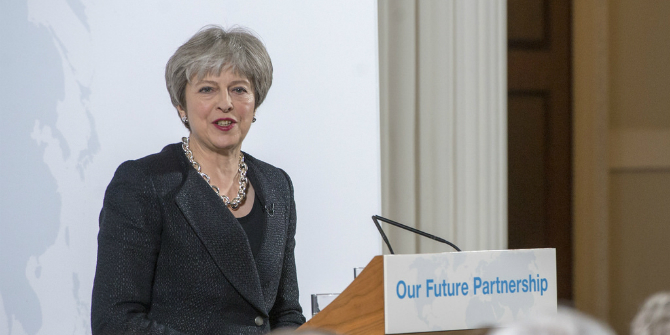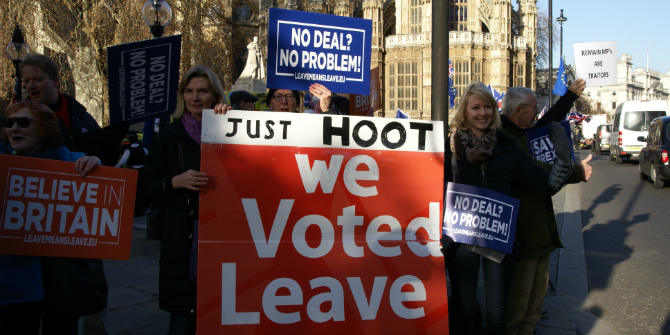 On Friday 2 March, Theresa May gave a speech in which she laid out some of the “hard truths” of Brexit, but her strategy with regard to the negotiations is as unclear as ever. Benjamin Martill (LSE) argues there’s value in being intentionally vague.
On Friday 2 March, Theresa May gave a speech in which she laid out some of the “hard truths” of Brexit, but her strategy with regard to the negotiations is as unclear as ever. Benjamin Martill (LSE) argues there’s value in being intentionally vague.
Does Theresa May have a Brexit strategy? To most observers of the chaotic Brexit process, the answer would be an emphatic ‘no’. May’s administration has lurched from crisis to crisis, is riven by internal divisions between Tory MPs, and has by all accounts failed to articulate a clear and coherent position in the first round of negotiations. Internecine warfare between proponents of a hard and a soft Brexit have been reignited by concerns that May is softening her stance on Brexit.
May’s recent vacillation over Brexit is often viewed as part-and-parcel of her weakness and the chaotic nature of her deeply divided administration, which – her critics contend – she has not been strong enough to. Thus, her approach has been described as “a strategy to avoid a strategy”, and her vacillation over Brexit – and between harder and softer rhetoric – is often understood in this context.
Yet, viewing May’s return to somewhat softer language as a product of her personal weakness is reductionist. And it ignores the role played by a number of important changes that have occurred since May outlined her Brexit position in January 2017. Importantly, the value of deploying uncompromising ‘hard Brexit’ rhetoric has diminished as the opening salvos of the bargaining game have receded into the distance, as domestic adversaries face a decisive ‘take it or leave it’ moment, and as the lack of clarity of the Brexit mandate makes a new ‘democratic moment’ all but inevitable.
 Image: Number 10 (Creative Commons 2.0).
Image: Number 10 (Creative Commons 2.0).
The girl who cried Brexit?
At the beginning of the Brexit process, May had strong incentives to bolster her credentials as a staunch Brexiteer. May was vulnerable, in particular from the right of her party. Support for her premiership among Tory traditionalists and Eurosceptics rested on her ability to deliver on Brexit. May also had reason to play hardball with the EU, since—as all experienced leaders know—the way to negotiating success lies as much in the ability to demonstrate the resolve of one’s position as it does in the ability to compromise when necessary. And, of course, May had to be seen by constituents to be implementing the Brexit mandate. While the result was suitably vague to allow for a vast range of options and the referendum itself conferred no requirements on the government, it is clear May felt the need to act decisively upon the referendum result.
So, there was good reason for May to talk the talk when it came to Brexit. (“Brexit means Brexit”, etc.). And yet, of course, actually obtaining a hard Brexit is not in May’s interest, nor does it follow from the mandate of the referendum.
For one thing, the national interest is often poorly served by the vagaries of public opinion. Moreover, the mandate given in the referendum was not at all clear. ‘The people’ may have spoken when they voted to leave the EU, but they did not make clear the precise configuration of institutional arrangements they envisioned withdrawal taking. The referendum result leaves open many different options, from the Norwegian and Swiss models to an immediate ‘no deal’ cliff-edge scenario and various (unspecified) permutations of ‘Norway-minus’ and ‘Canada-plus’ in-between. And, perhaps more importantly, there is not a single outcome that will please everyone, since minorities of the population support hard Brexit, soft Brexit, and no Brexit, respectively.
This, then, is the gulf between what Theresa May (or any prime minister) wishes to do, and what they feel need to show. And yet, as the months have passed since the triggering of Article 50, May’s incentives to talk tough on Brexit have decreased, as (unsurprisingly) has her propensity to flirt with softer options.
The times they are-a-changin’
The need to deploy hard-line rhetoric as a bargaining strategy has diminished as the negotiations have gotten underway. The government’s ‘red lines’ have moderated over the course of the negotiations—as we would expect them to—as has its rhetoric. We have gone from ‘red lines’ to ‘regulatory harmonisation’ in a few months. Even if Britain’s relative weakness in the negotiations meant the UK’s bluffing strategy was not as successful as May might have hoped, this does not change the fact that the incentives for hard Brexit ‘bluster’ have diminished considerably.
May is also less vulnerable from the Tory right-wingers, since she has a deal (of sorts) in hand, and since the clock is ticking. Whereas a challenger could have taken charge of the Brexit process in late 2016 or early 2017, now all they can do is spoil an ongoing process. By feigning a hard Brexit stance that is not likely to be mirrored in the outcome of the (largely secret) negotiations, May has pushed her hard-line Eurosceptic adversaries to the edge of the cliff. They can still depose her, but they cannot do so without adopting the arrangements she has already agreed with the EU or scuppering the entire process.
Moreover, the shadow of the referendum mandate itself will continue to diminish as it becomes evident how unclear the mandate actually is, and how a second ‘democratic moment’ will be required to legitimate any outcome. The question of the mandate from the referendum will be put to rest only through the establishment of a new mandate. Legitimation of the Brexit deal will come through the parliamentary vote, and—if it passes—a possible subsequent general election.
Fantasy or reality?
This, in short, is Theresa May’s political strategy for dealing with the Brexit problem: to head off opposition from the right until conditions allowed her to present a ‘take it or leave it’ deal allowing for the legitimation of a soft—or at least softer—Brexit. This may not necessarily come to pass, of course. History is littered with examples of failed strategies. But reductionist and ad hominem caricatures of May as a weak and directionless leader can only go so far in explaining the recent softening of her rhetoric on Brexit.
This post represents the views of the author and not those of the Brexit blog, nor the LSE. It first appeared at the Dahrendorf blog.
Dr Benjamin Martill is a Dahrendorf Fellow on the project Europe After Brexit at LSE Ideas and a Research Associate at the UCL European Institute.







“May’s recent vacillation over Brexit is often viewed as part-and-parcel of her weakness and the chaotic nature of her deeply divided administration, which – her critics contend – she has not been strong enough to. ”
er.
Go on.
Your point about delay having impeded a challenger from taking charge such that now all they can do is spoil an ongoing process is well taken iff this be a Fabian strategy. However she may also be waiting for the polls to show a change of heart. This is a long time a-coming.
You assume that Theresa May is dissembling, and is really a soft Brexiteer at heart. As a Remain supporter, I obviously hope you are right.
However, if she is being a bit shifty, is it not possible that she is a hard Brexiteer at heart? Those of us not privy to confidential discussions in Downing Street have no way of knowing.
Indeed anybody who is crazy enough to keep on supporting Brexit, even in a softened form, must have some sort of hidden agenda to keep on with such an apparently suicidal course of action. The most obvious is that you are some sort of “disaster capitalist” who wants to make a quick buck out of a disintegrating European Union.
I reckon the hard brexiteers are now willing to let May offer the EU just about anything she likes as long as it is reversible. They are now desperate to reach March 29 2019 and exit before the electorate realise what awaits them. Permitting the temporary illusion of a soft brexit helps to get it through parliament.
You depict Theresa May as a modern day Queen Canute demonstrating to her followers the utter folly of trying to stand against the tide of economic reality by seemingly attempting to defy it and then ultimately and intentionally conceding inevitable failure. There is evidence that her instincts and her calculations of the UK’s best interests might be as you have depicted. On the other hand it would be to place a great deal on trust in a conjecture. Some in the hard Brexit lobby have obviously also been strategising along similar lines and prepared their fall back option as encouraging support for a “second referendum” on the assumption that the “crash out of the EU” option is on the ballot paper. If Theresa May acts as you have predicted, they would try to use a second referendum to throw out a soft Brexit deal and crash out of the EU.